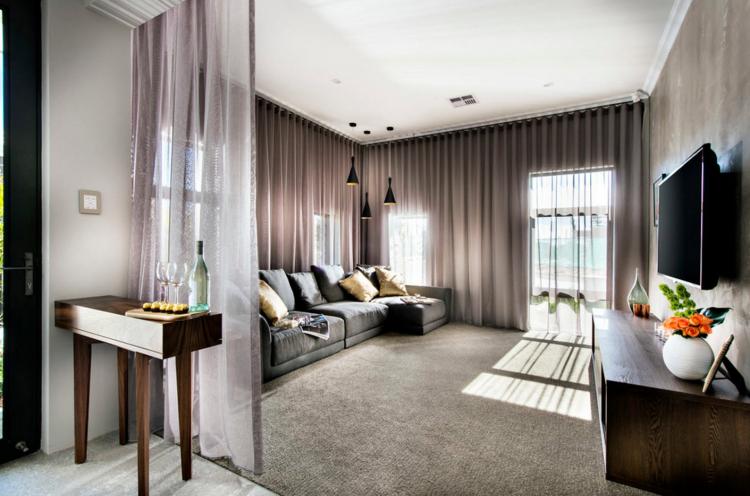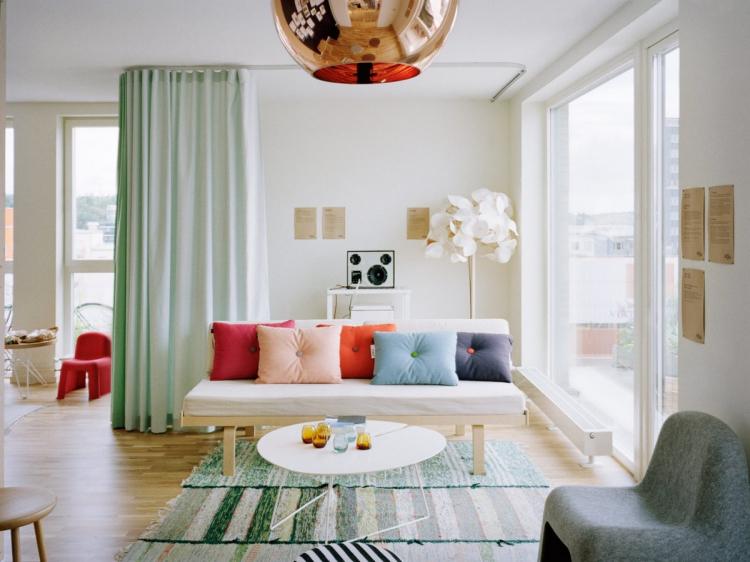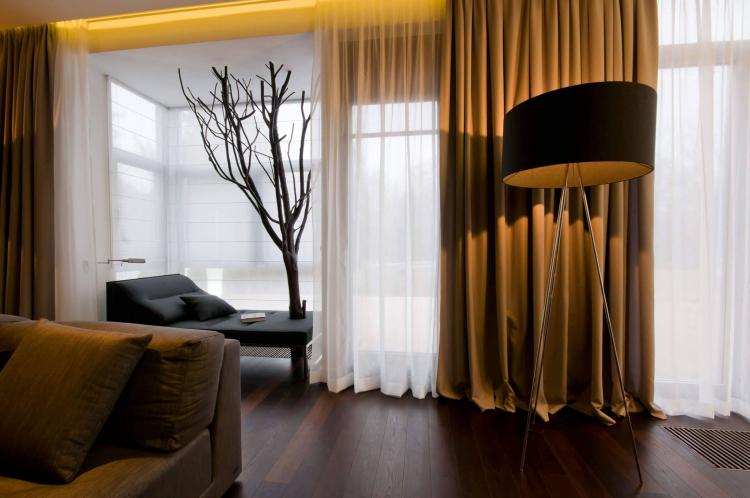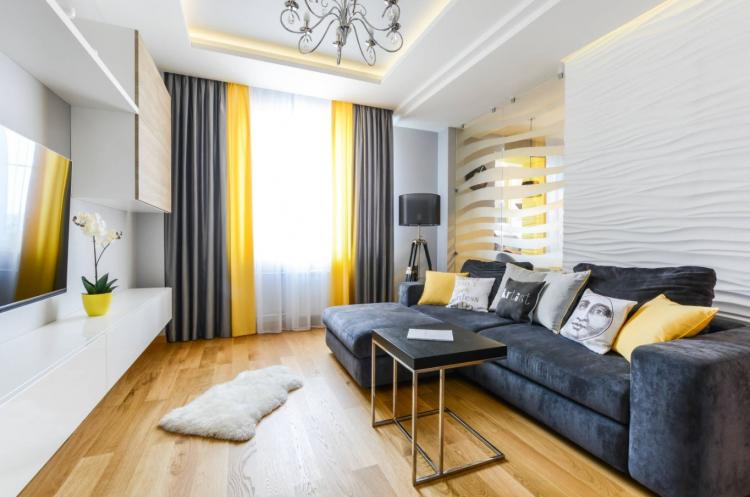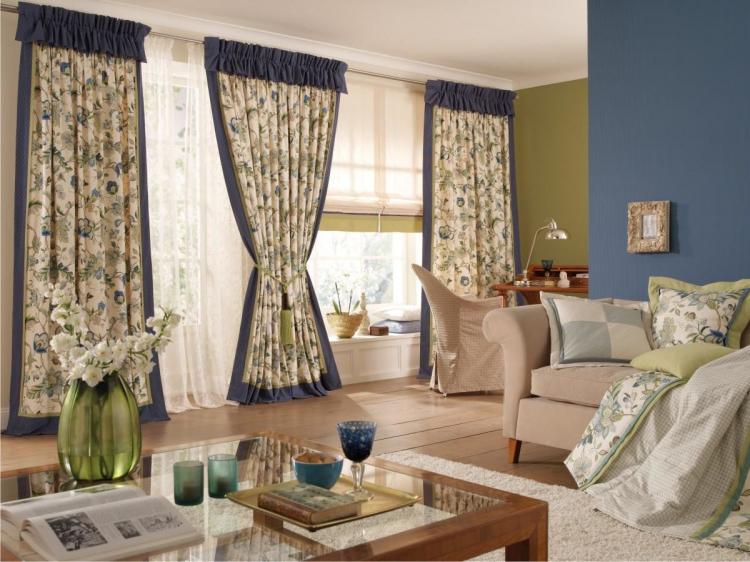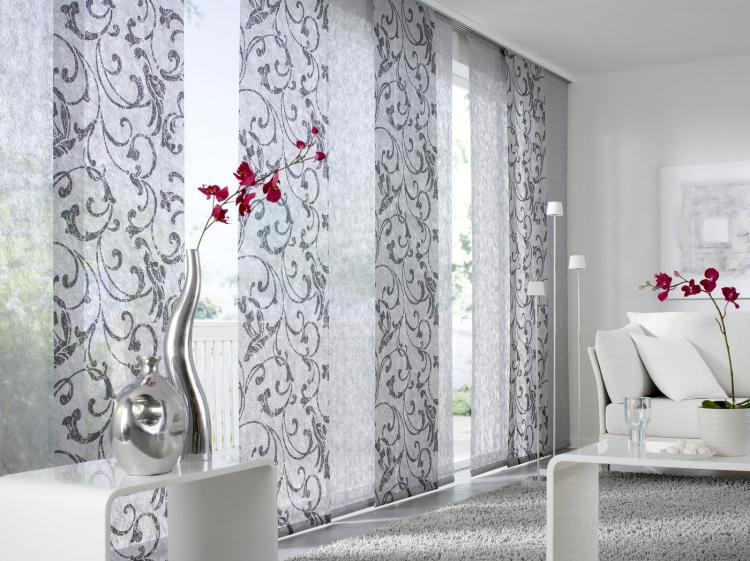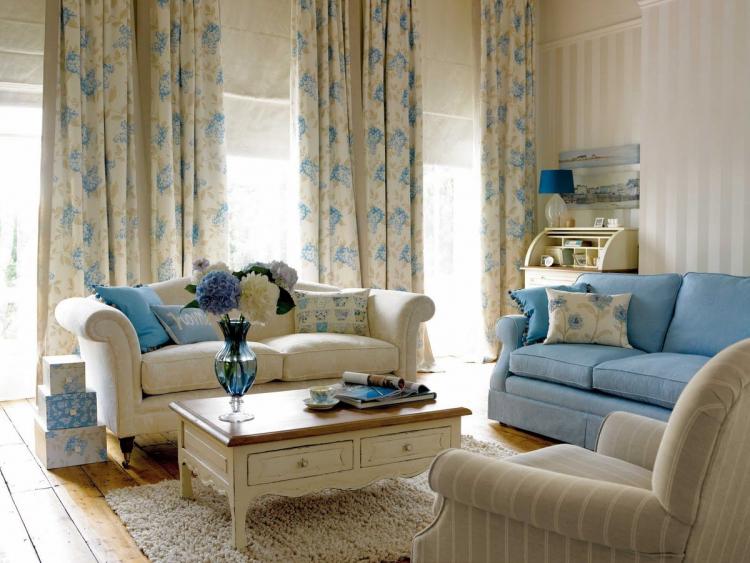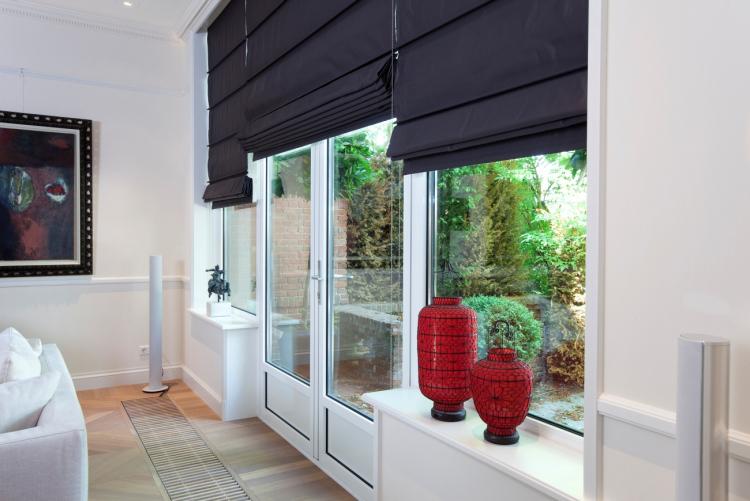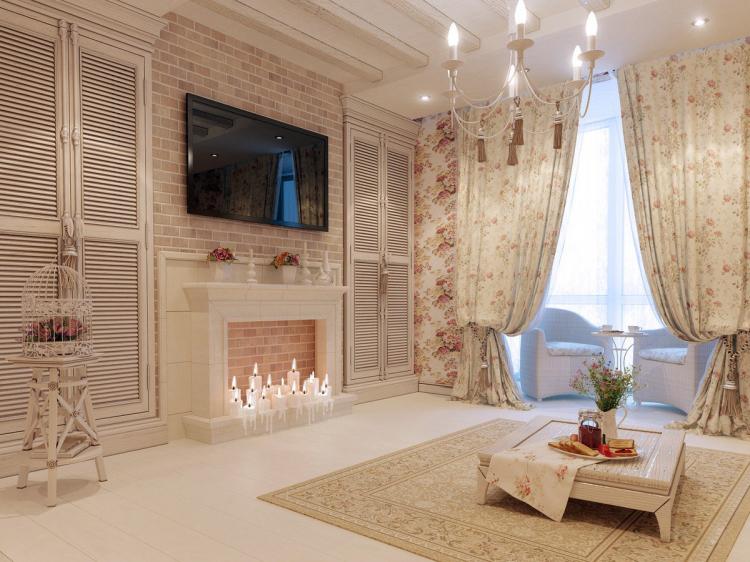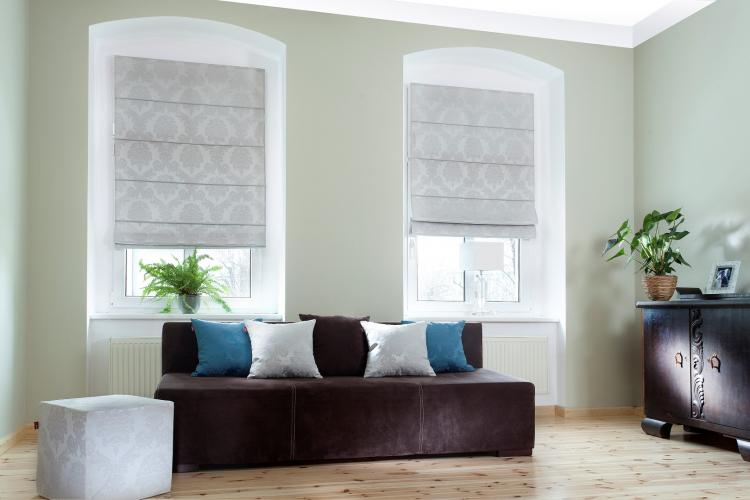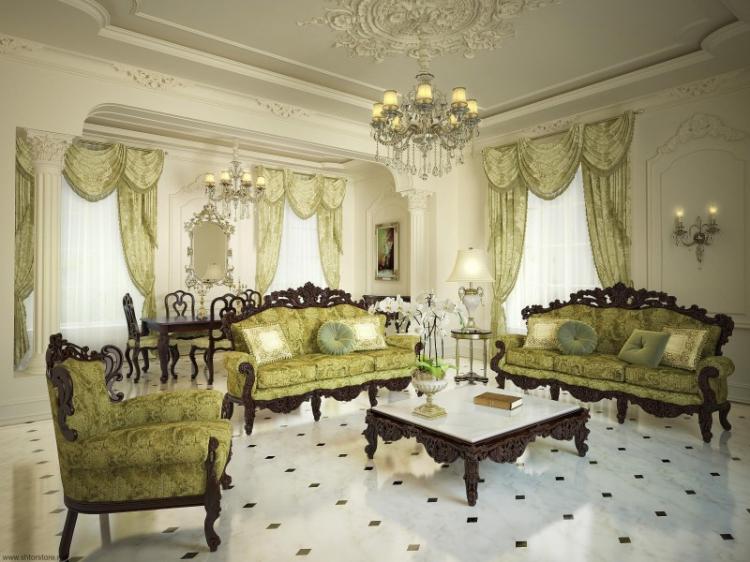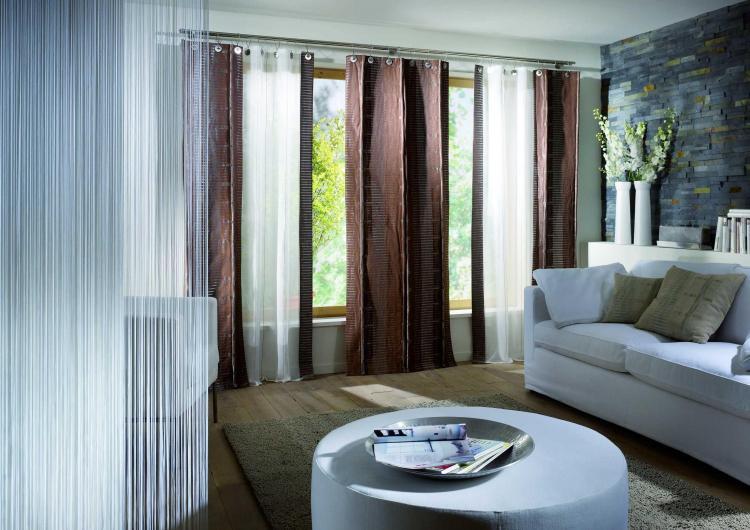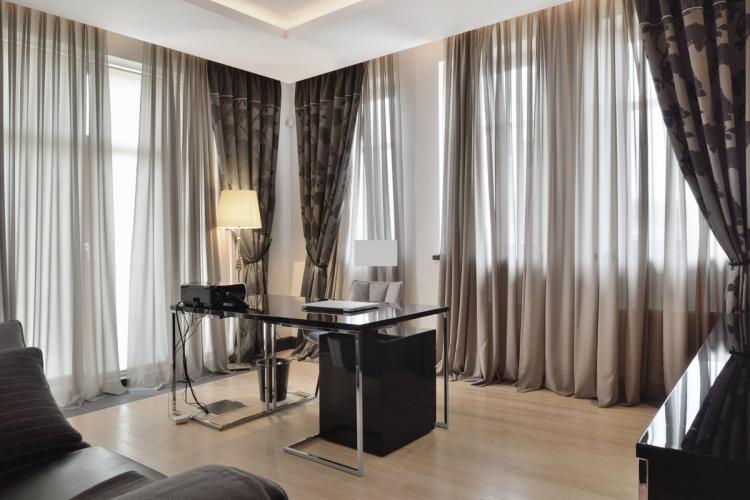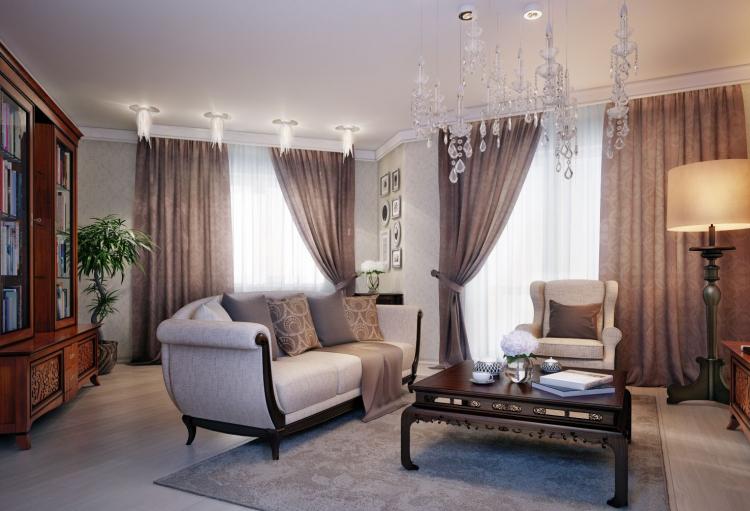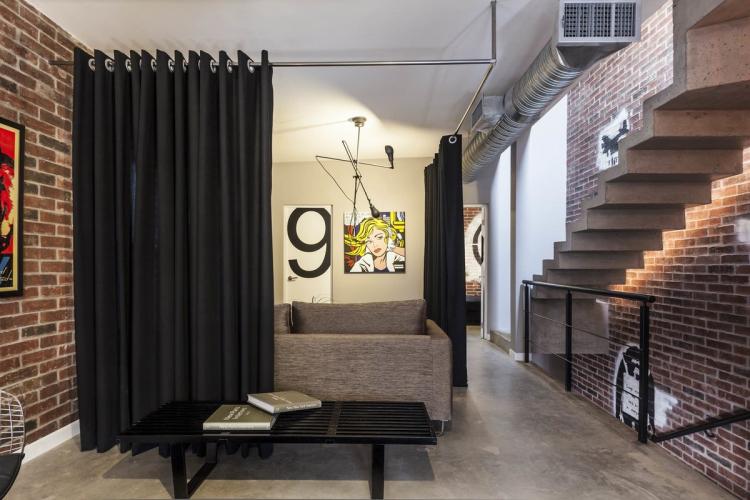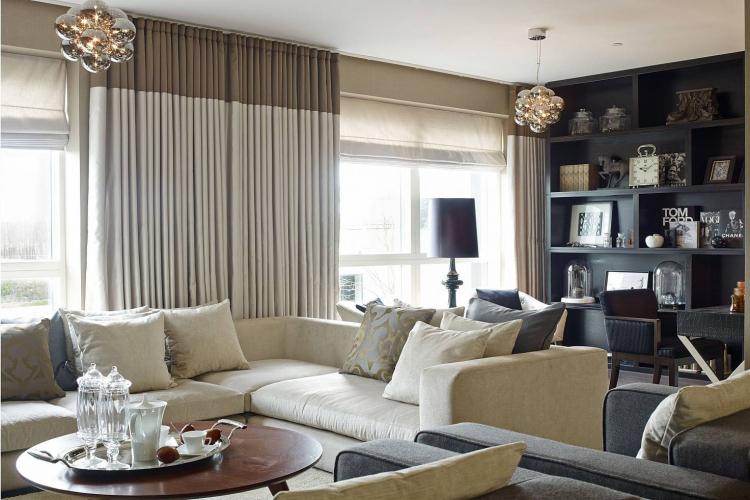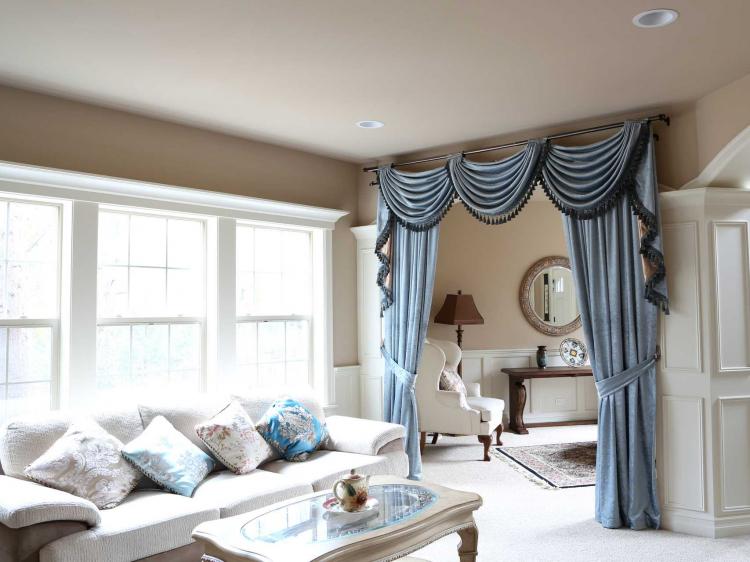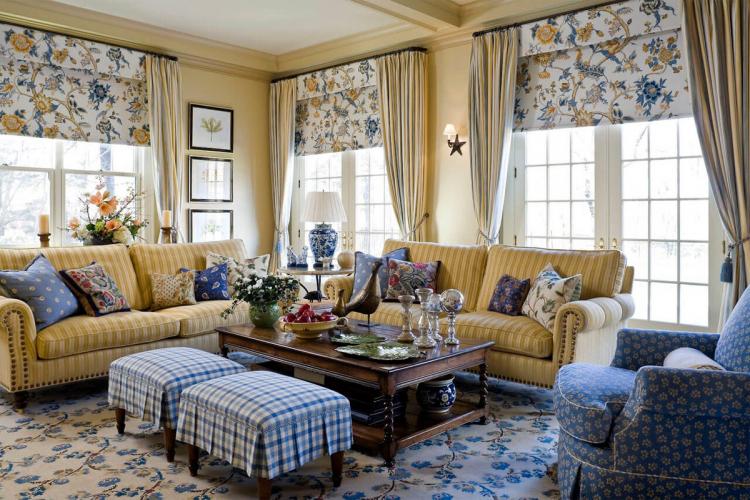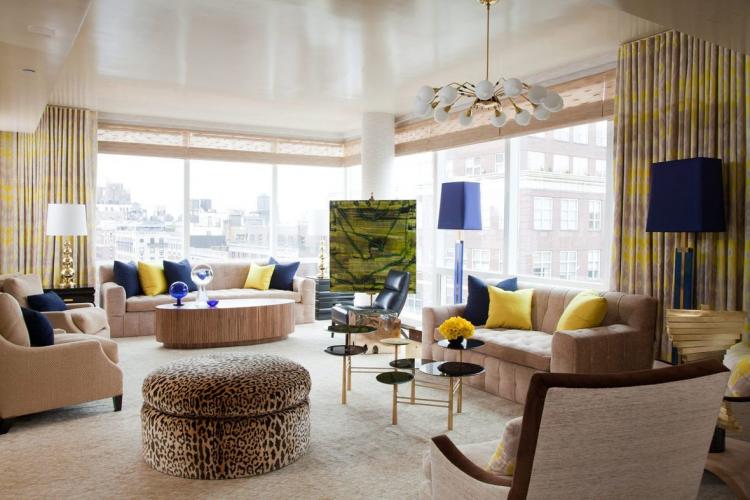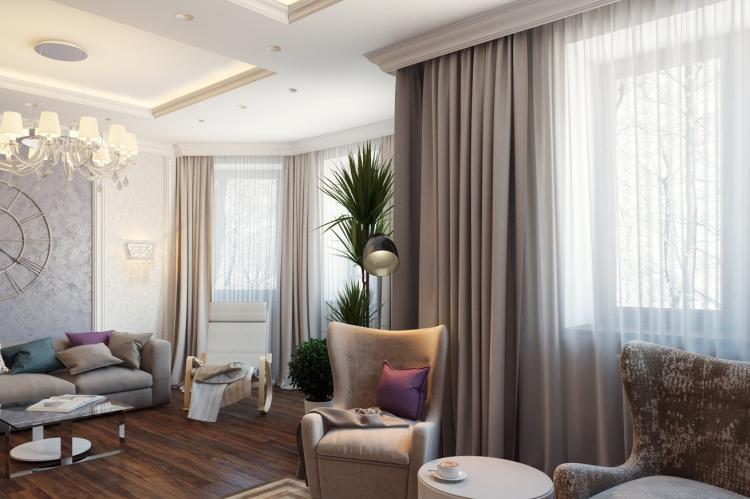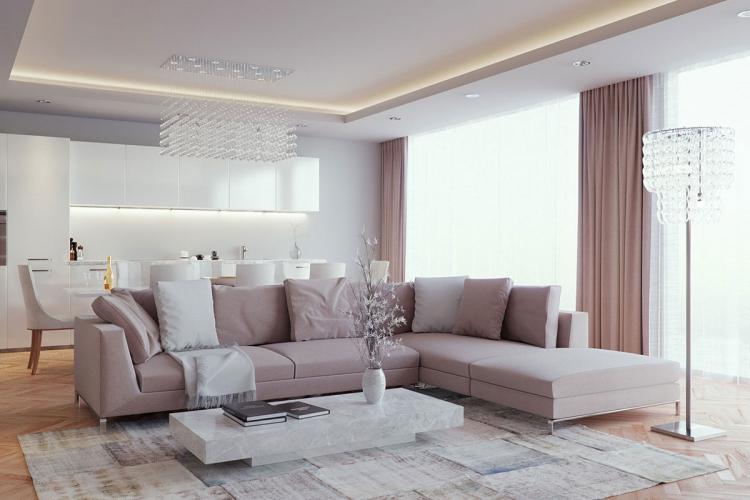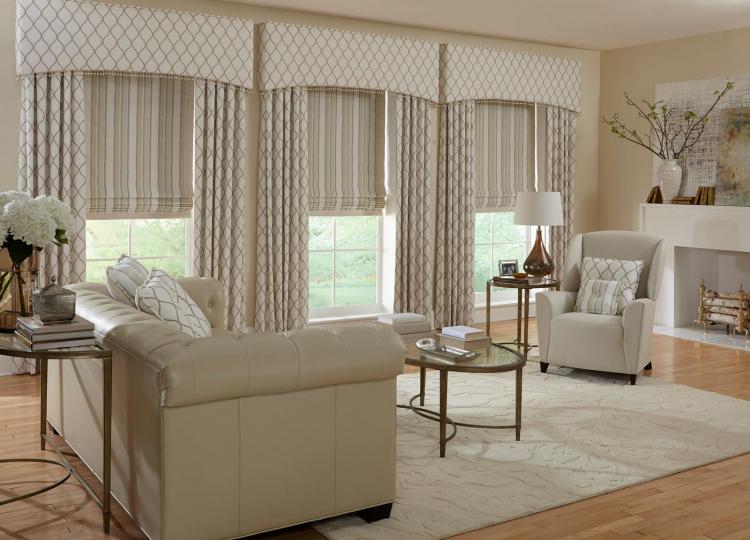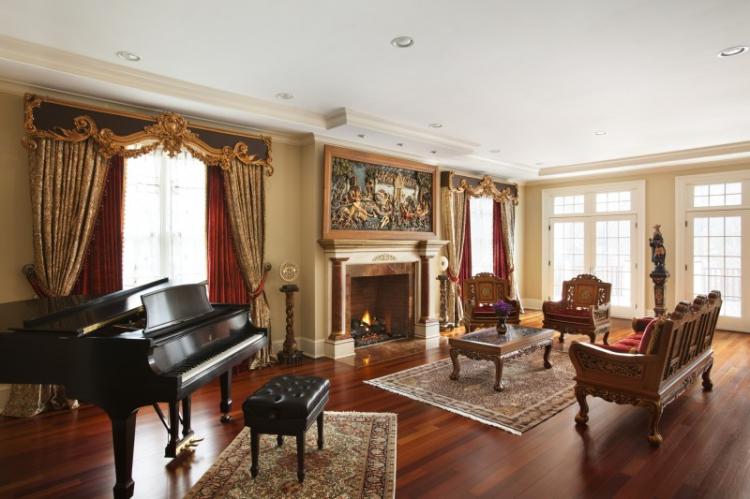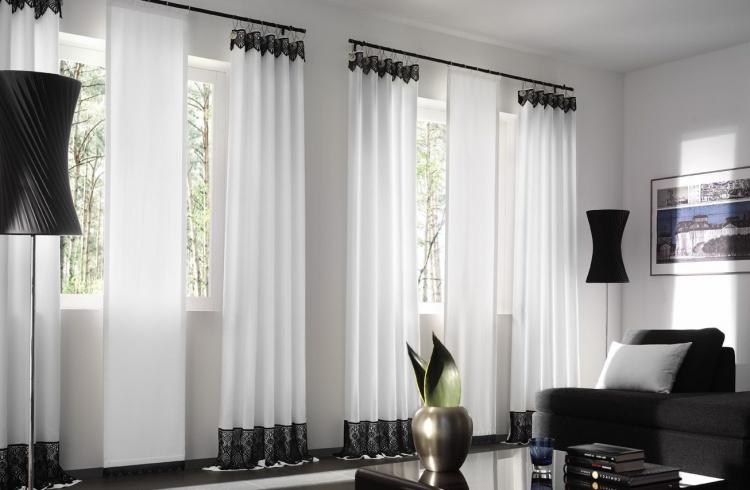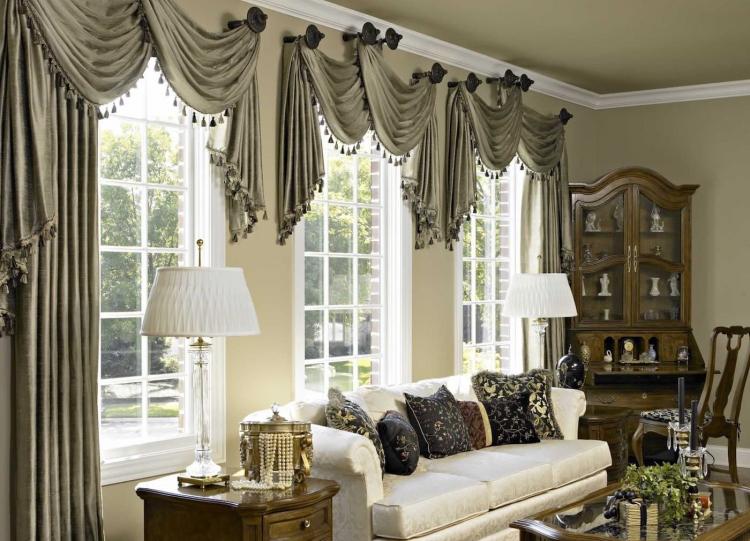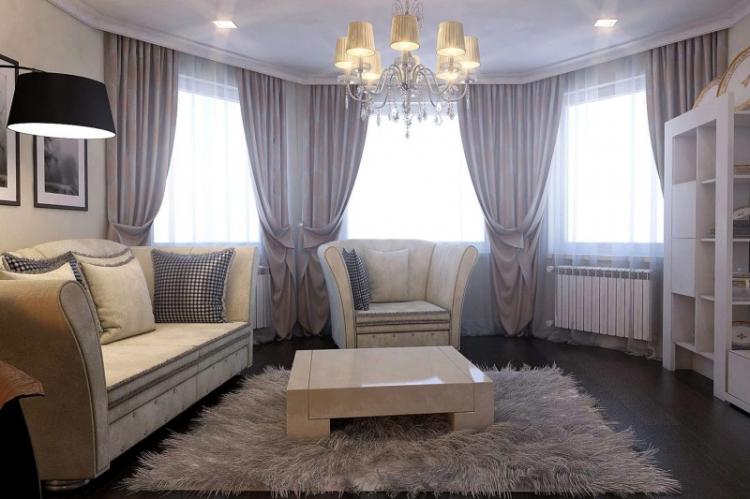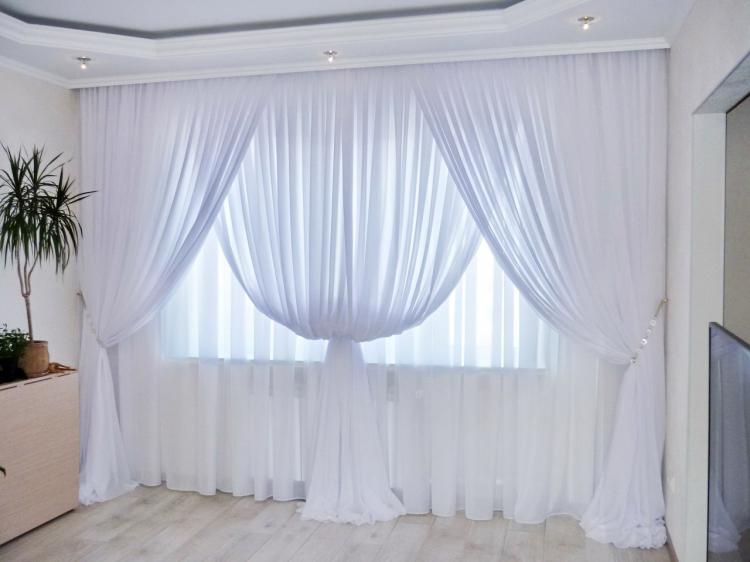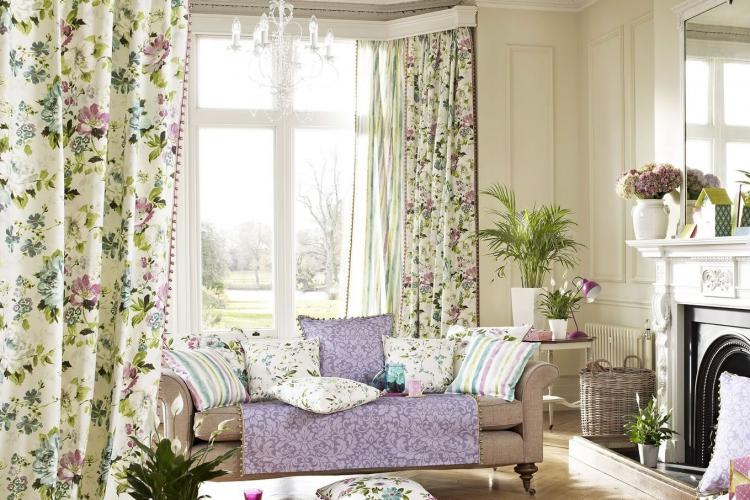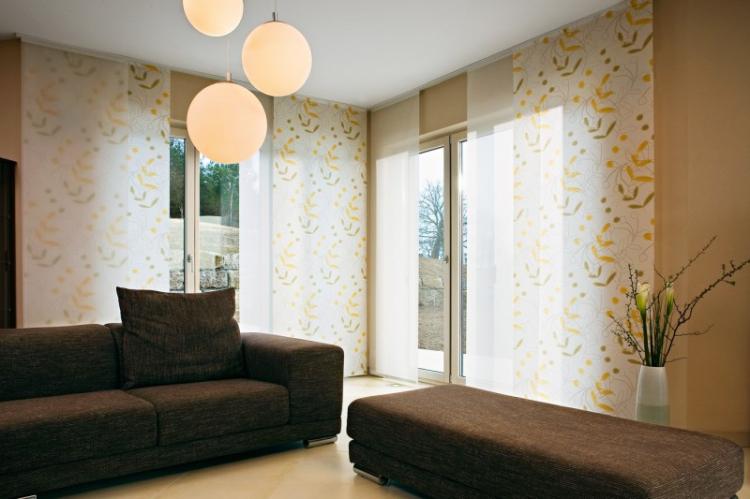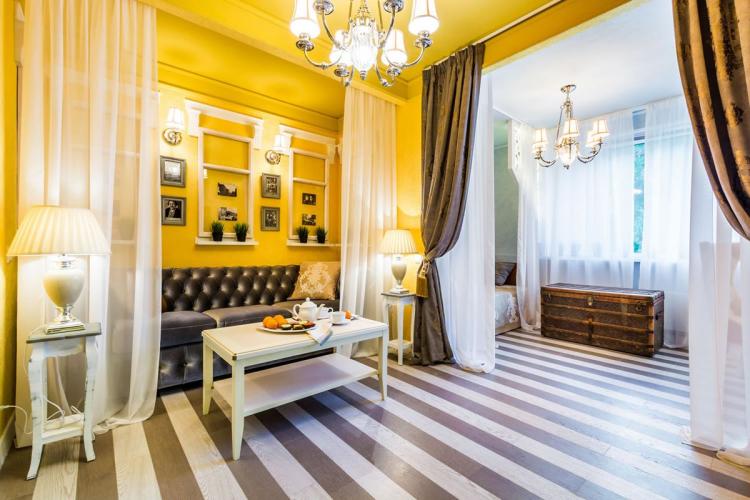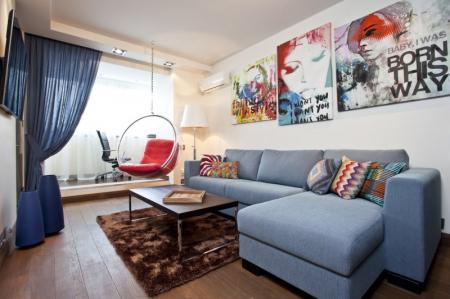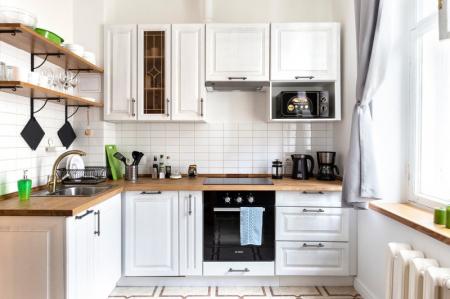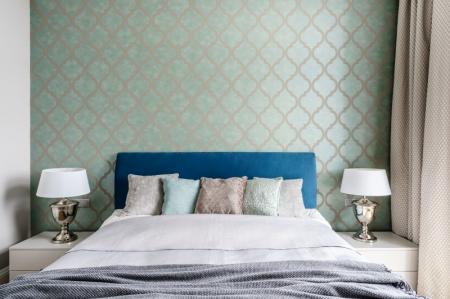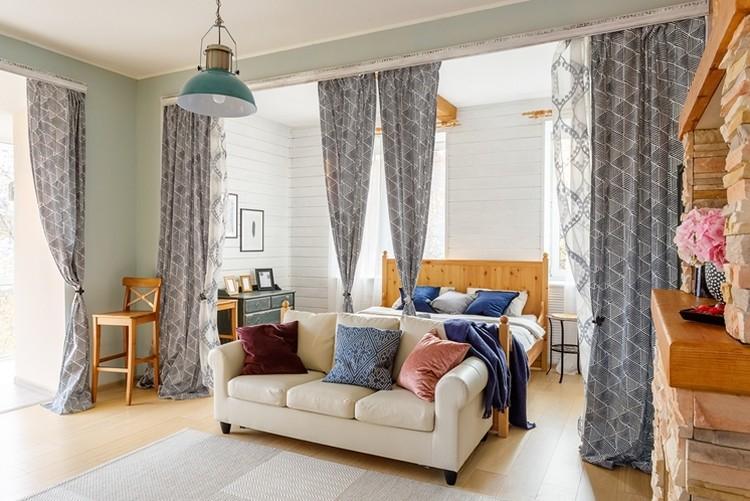
Bright sunlight looks amazing, but everything has its limits. Even in a welcoming living room, too much sun is sometimes uncomfortable. Therefore, do not rush to resolutely abandon curtains, even if you are the lucky owner of a luxurious panoramic view. Moreover, beautiful and well-chosen textiles are an amazing accessory for creating an atmosphere of home warmth and comfort!
Types of curtains for the living room
There are so many types and configurations of curtains that you can really get confused among them. The living room allows you to experiment with the most complex and original solutions that might not be appropriate in the kitchen or bedroom.
Classic curtains
Traditional curtains with curtains or tulle are in no hurry to give up their positions. Especially in classic interiors. They can be decorated with brushes, clamps, grabs, lambrequins, and create complex multi-level compositions.
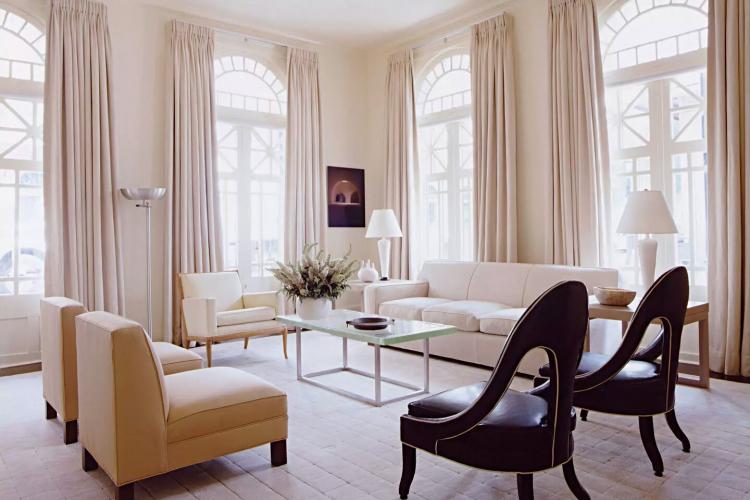
Italian curtains
Italian curtains resemble classic curtains, but with one significant difference: they do not move apart along the cornice. The window can be opened using side holders and grabs. This is another traditional decorative solution for lush and opulent styles.
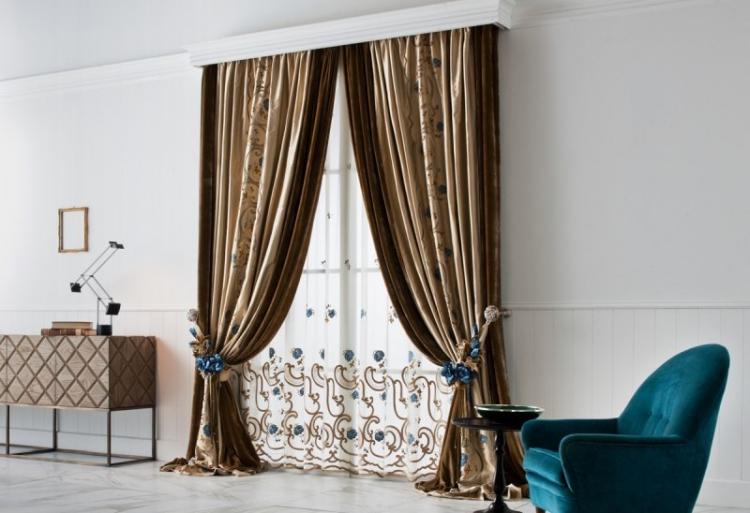
Austrian curtains
Their lower part is gathered into beautiful decorative pleats. Height and rise are adjustable with ties, loops and rings. These curtains are very elegant and decorative.
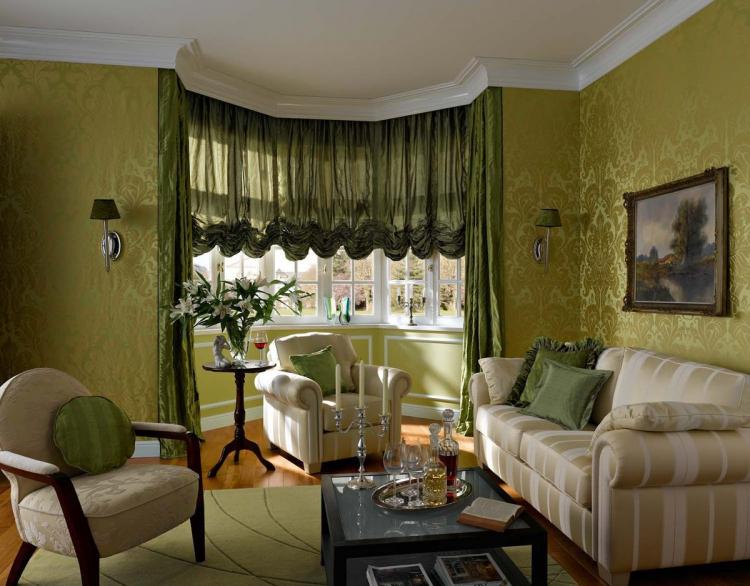
French curtains
Another decorative design reminiscent of the Austrian "colleagues". The difference is that the French curtains are gathered up to the very top, along the entire length. They fall in graceful rounded waves and immediately give the room an atmosphere of solemnity.
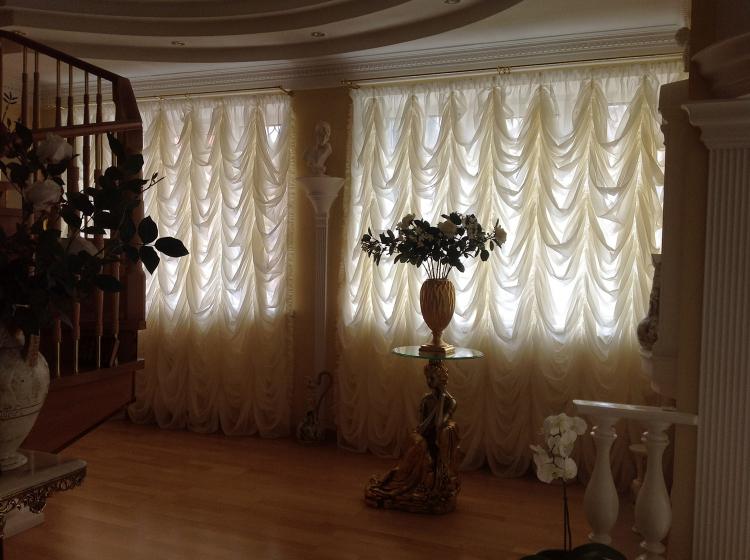
English curtains
Another variation on the theme of canvases with grabs in height, but if Austrian and French curtains can have many such grabs, then English curtains traditionally have two of them - with small indents at the edges. In the best traditions of strict British classics.
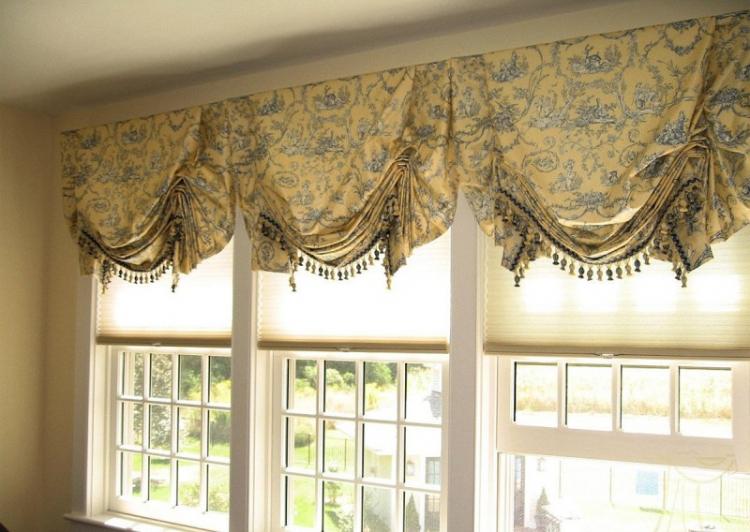
Roman curtains
The old-fashioned solution is now more appropriate than ever: the best illustration of the cyclical nature of fashion. This is a dense canvas stretched over a rigid frame, which is rolled out close to the window. It can be fixed at any height, completely opening or closing the window tightly.
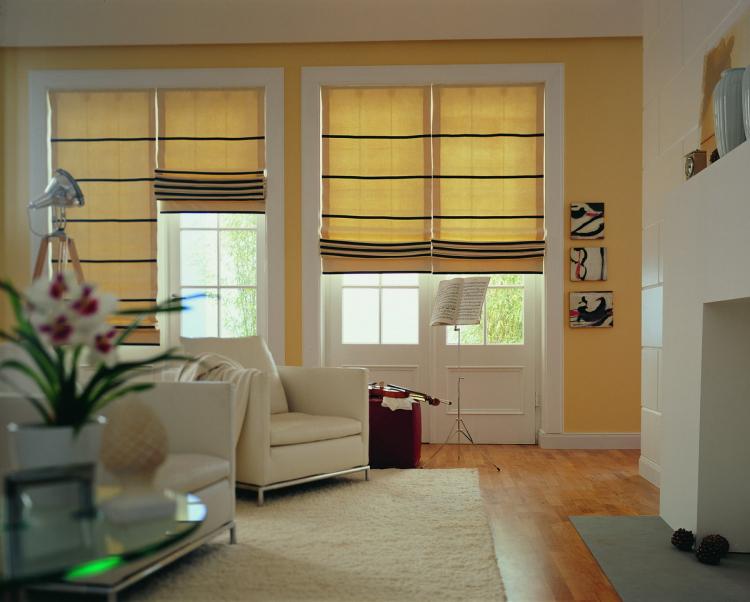
Japanese curtains
Japanese curtains resemble a screen or those same classic oriental sliding partitions. Light vertical canvases are stretched over a frame that runs along the window.
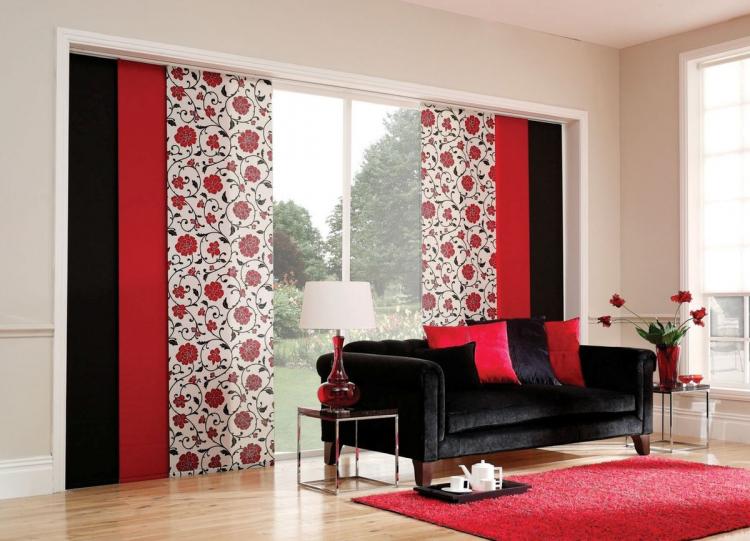
Blackout
Blackout curtains completely block out sunlight, which is why they are most often used in bedrooms. But in the living room, this option may be appropriate. For example, if you often host movie nights in an impromptu home theater.
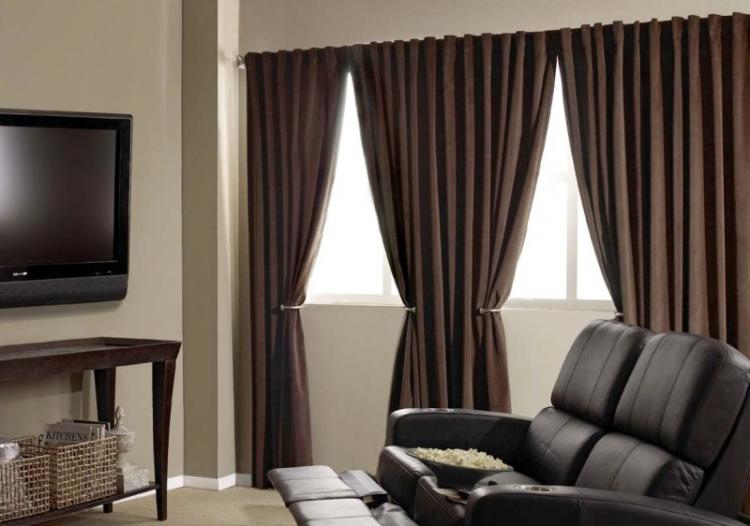
Curtains-priscilla
In everyday life, they are called crossed curtains. The two draperies are completely connected at the top edge, and the ends are pulled apart. The material is mostly translucent, because such curtains greatly darken the room. But they look soft and elegant.
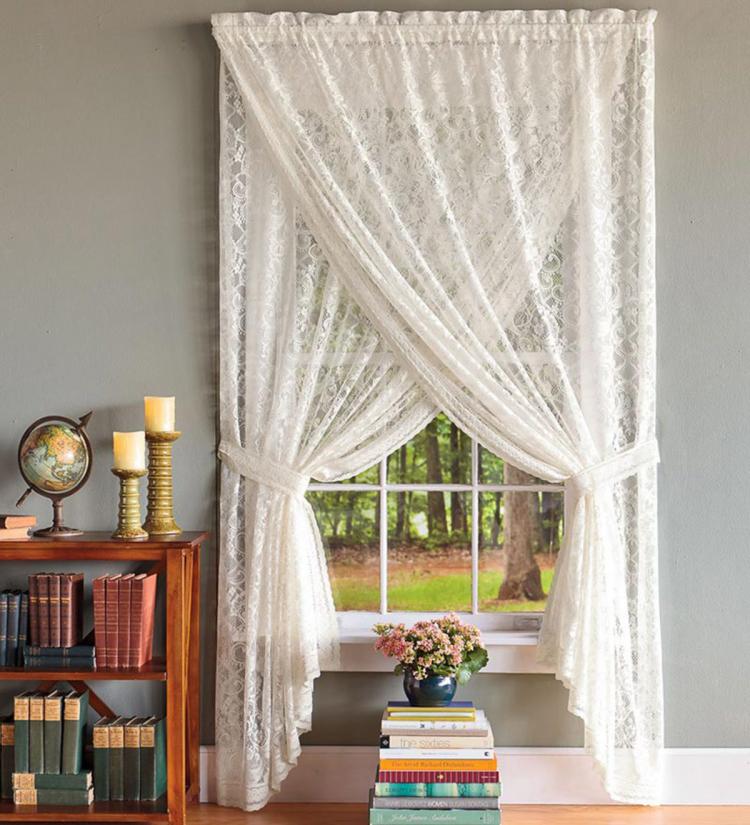
Cafe curtains
The frame of the cafe curtain is attached in the middle of the window, and not above it. They are rarely found in homes and apartments. But they create a comfortable and cozy effect of uniform diffused light in the room.
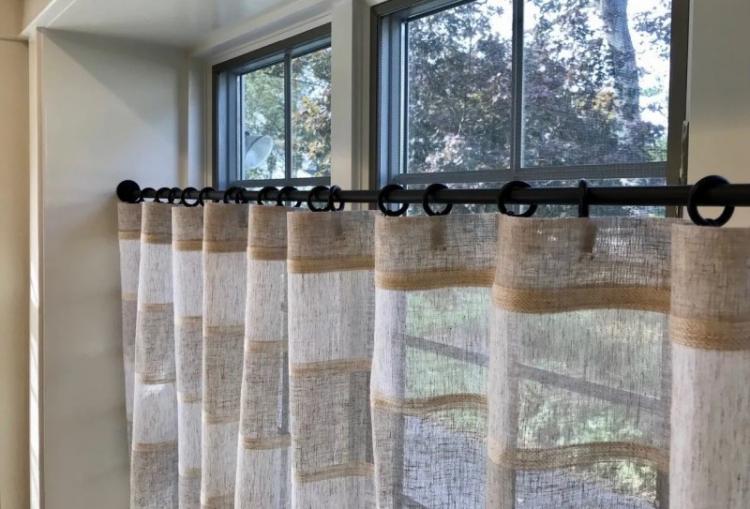
Methods for attaching curtains
With roller blinds, everything is clear: the design has been worked out in advance. It just needs to be fixed above the window. But classic curtains can be fixed in different ways. Fortunately, the living room allows this too!
Strings
The canvas is attached to the cornice with laces, ribbons or braid. This option is not suitable for too heavy fabrics, because the knots will constantly untie. But elegant bows will only emphasize the elegance of an airy curtain or tulle with an openwork floral pattern.
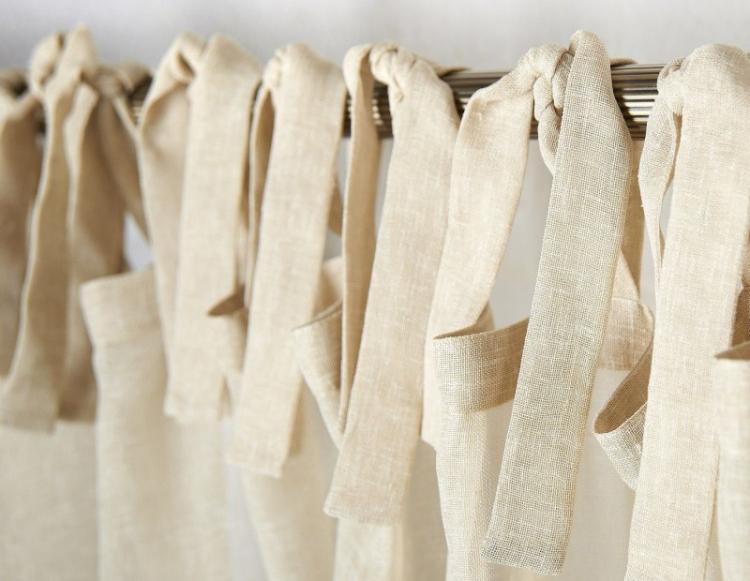
Hinges
On the upper part of the curtain, ready-made decorative loops immediately pass, which are put on the cornice.They differ from strings in that they do not need to be tied by hand. Loops can be solid or with fasteners in the form of buttons, buttons, Velcro. The quantity is calculated taking into account the width and weight of the canvas.
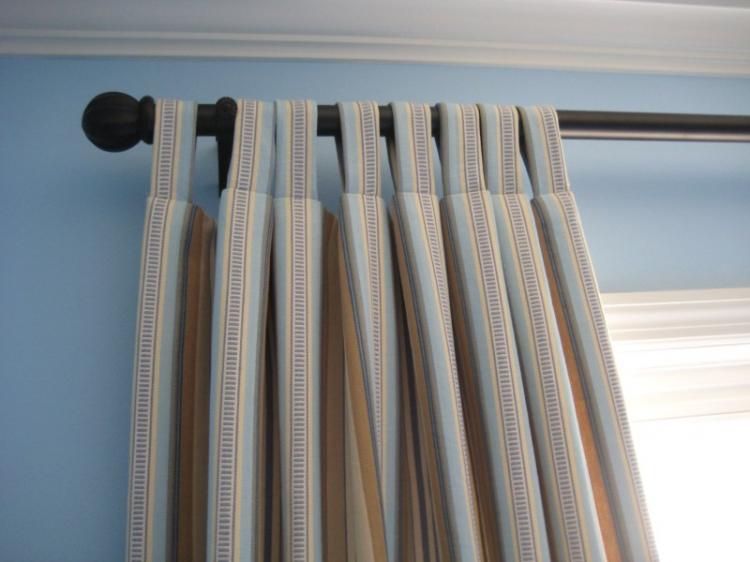
Backstage
The cornice is inserted into a makeshift fabric tunnel, following the principle of hood puffs. Due to the absence of solid fasteners, such curtains are the quietest, but they are difficult to remove for washing and beautifully draped.
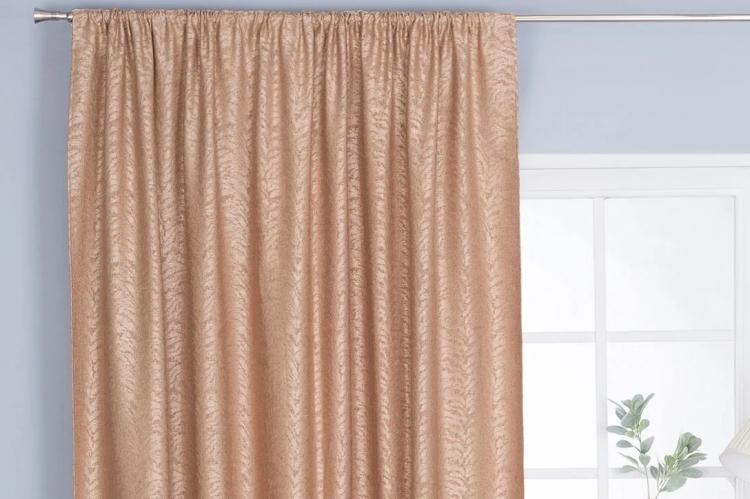
Braid
A decorative tape is sewn on top of the curtain, which creates small and frequent uniform folds. This texture cannot be repeated with other fasteners. Keep in mind that the piece of fabric under the braid should be one and a half to two times wider than the window opening.
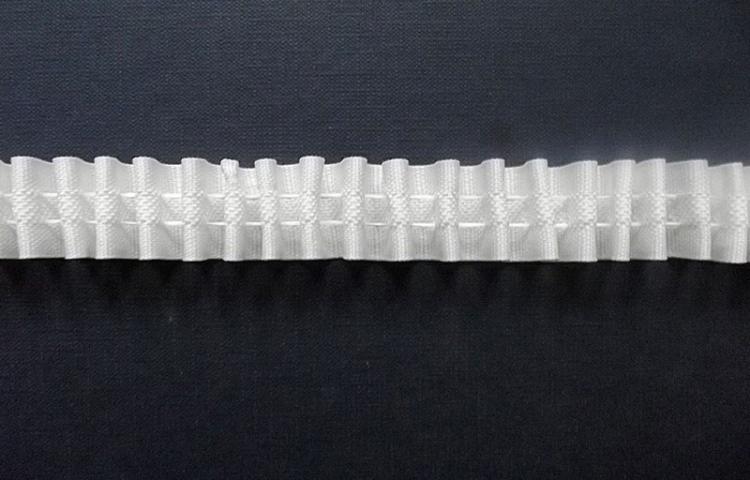
Eyelets
Eyelets are special rings inserted into the holes along the top of the curtain. They can be made of plastic or metal. If made to match the fabric, the eyelets are almost invisible when installed. And their main plus is textured and uniform folds even on heavy curtains.
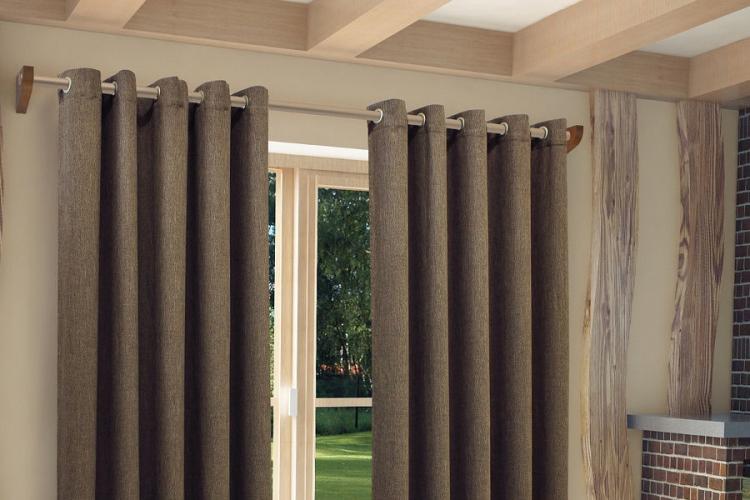
Rings and Clips
Cornice rings are one of the most common solutions in Europe and America. They differ from eyelets in that they are attached to the upper edge of the fabric, and not "embedded" into it. Therefore, it is easier to remove such curtains from the eaves.
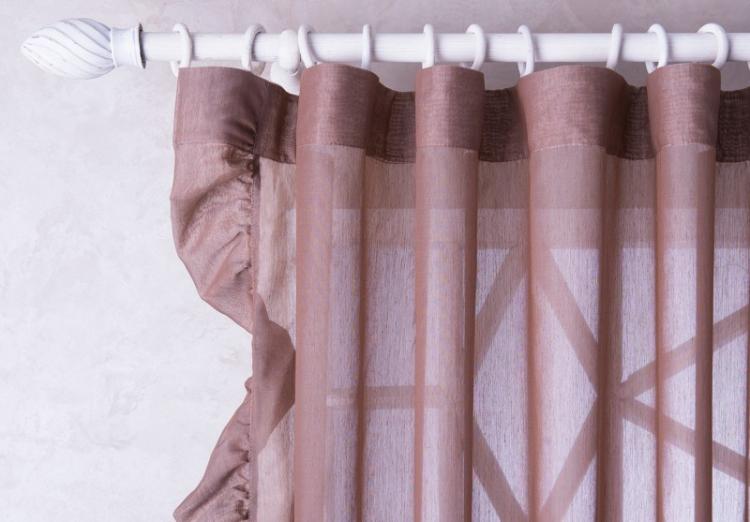
Living room zoning curtains
Curtains and textile partitions are one of the classic ways of zoning space in the living room. For all its simplicity, this solution has a number of advantages.
- Low cost. Even luxurious expensive curtains are cheaper than complex stationary structures made of wood or glass;
- Ease of installation. Hanging a curtain is much easier than installing a plasterboard partition. Everyone can easily cope with this;
- Mobility. If necessary, the curtains can be removed without leaving a trace. Of course, folding screens can also be removed, but even when folded, they take up space, unlike a cut of fabric;
- Variety. The curtains can be easily changed according to the situation and mood. Refreshing textiles is the easiest way to refresh any interior;
- Ease of maintenance. It is enough to wash the curtains in a typewriter and hang back.
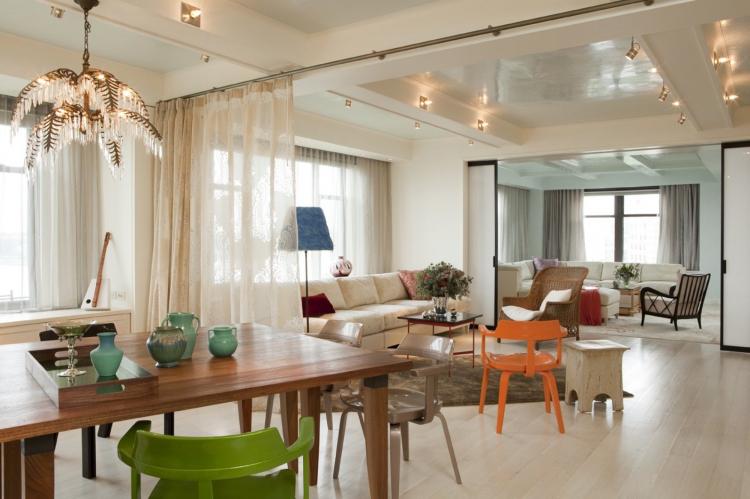
But there are also disadvantages. First, you will have to think about how to embed the cornice into the ceiling structure. Secondly, textiles in the interior always require careful maintenance, because even the most modern fabrics gradually absorb odors and dust.
With the help of curtains, you can separate the couch, work area, extra bed. They fit perfectly into combined studios to symbolically divide the kitchen, dining area, and the living room itself.
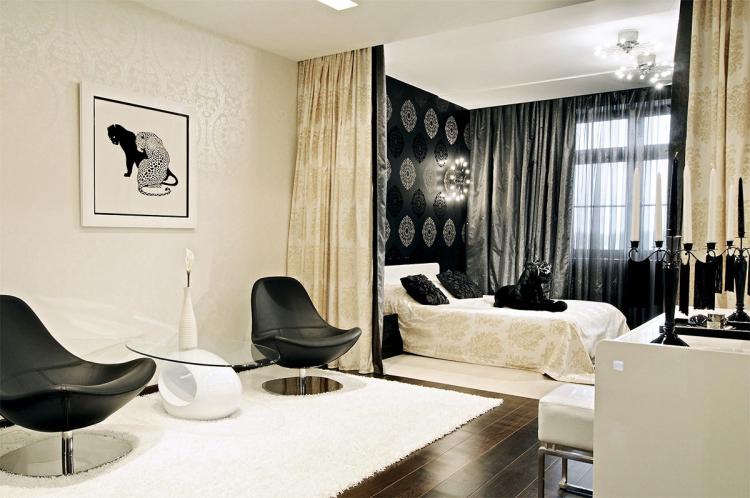
Curtains in different styles of interiors
The variety of shapes, fabrics and colors makes it easy to choose curtains for the living room in any interior. Both luxurious baroque and technological futurism will not remain without beautiful and functional curtains.
Country romance
Country, Provence, chalets, shabby chic, boho and their variations are cozy and warm country houses. Choose natural fabrics, pastel shades, floral ornaments, small and elegant decor. Flounces, openwork inserts, braid, hooks look good.
Pay attention to all the curtains falling in waves: Austrian, French and even more strict English. Linen curtains are good for a rough living room interior. Even burlap can be used in country for business use.
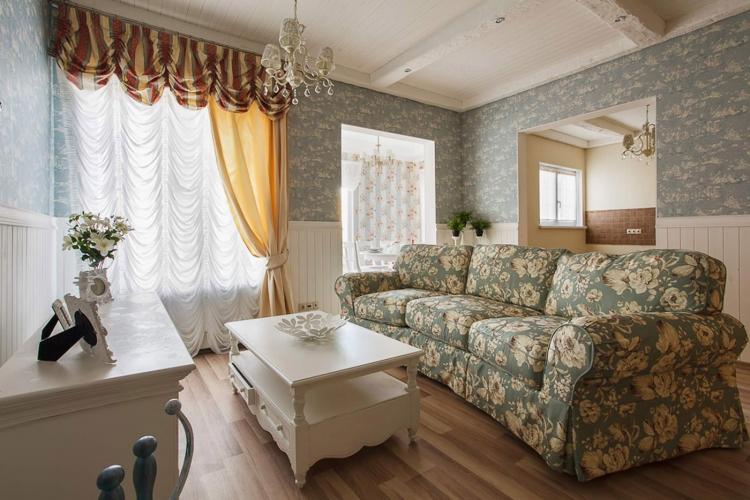
Palace luxury
Lush baroque, rococo, empire style, palace classics - all this requires scope and monumentality. Choose expensive luxurious fabrics, because even capricious velvet will be appropriate here. Create complex layered compositions.
Use abundant gold and silver decor, heavy lambrequins, voluminous brushes, hooks. Change the organza tulle to natural silk with embroidery. And for the most chic classic interiors, the curtains are sewn by hand.
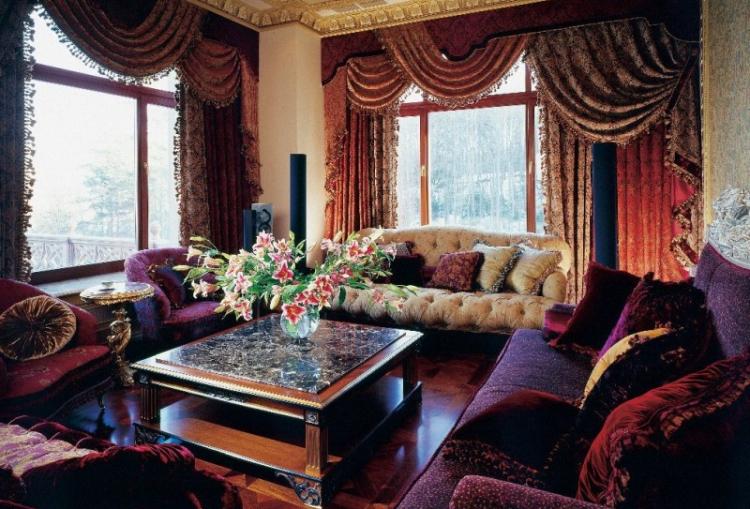
Pragmatic minimalism
Stylish technological minimalism, ultra-modern hi-tech and eclectic contemporary all the same do not refuse curtains in the living room.The form and materials are not so important here, but feel free to experiment with textures and colors.
Combine different fabrics, create bright accents from curtains. Choosing the right textiles is the best alternative to excessive decor that does not fit into the concept of minimalism. Even the most laconic living room will become creative and individual.
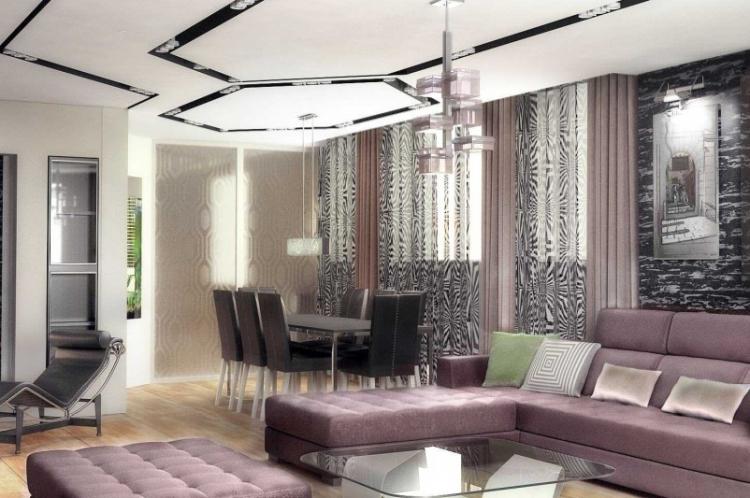
Cozy eco-trends
In recent years, eco-trends and the maximum rejection of artificial materials have remained in fashion. This is reflected in different directions, from the popular Scandinavian style to the decorative Mediterranean style.
In addition to natural fabrics, use the same natural shades: beige, brown, sand, green, blue. Instead of abstract geometry - sophisticated floral motifs. These curtains are good on hinges and ties.
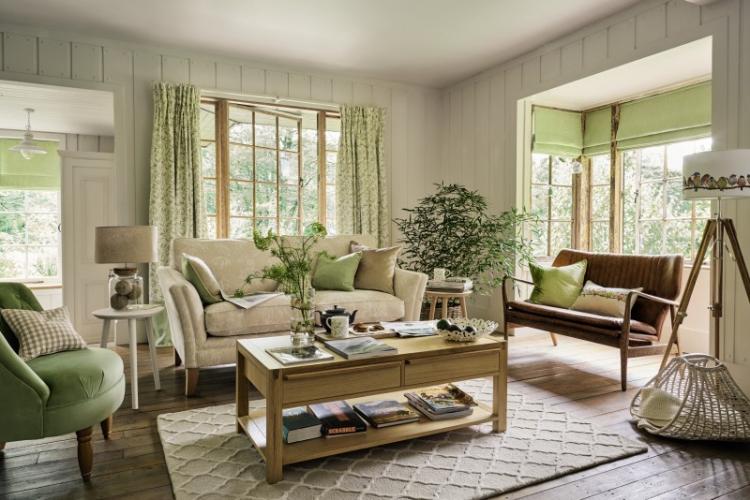
Artistic industrialization
Even a rough and pragmatic industrial loft uses textiles anyway. And especially its softer and neutral "descendants", like grunge in the interior.
Pay attention to the long, dense, bright curtains that run the entire wall from ceiling to floor. Stretch out a long cornice and leave a small niche in the corner, and then, if desired, the windows can be fully opened, and the curtains can be hidden.
Or use roll structures. Roman blinds of their coarse fabrics in restrained terracotta, graphite, concrete shades will fit into the loft, like a family.
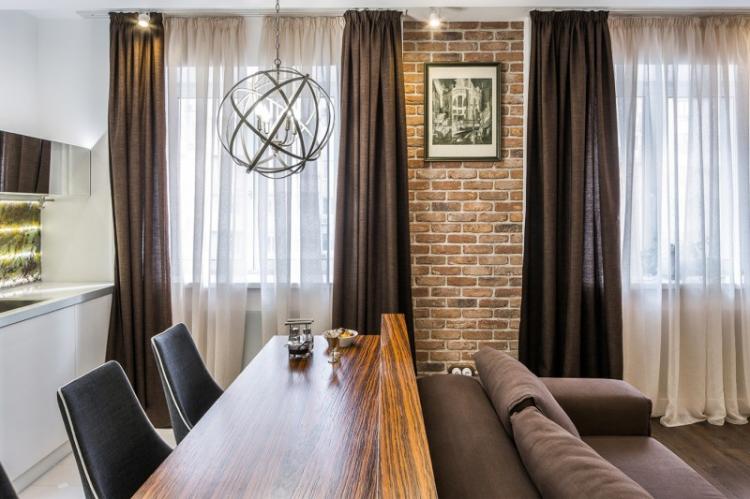
Curtains for a small living room
In a small living room, voluminous expressive curtains and multi-level compositions are unlikely to fit. When space saving comes to the fore, choose curtains that fit as closely as possible to the window.
A good and practical choice is roman blinds. They are the most compact and functional, but at the same time much more elegant than plastic blinds. Light French or Austrian curtains will fit into romantic interiors. But be sure to choose thin and airy fabrics.
The main rule for a small living room is that the simpler the better. Avoid heavy structures and fabrics that are too dense and heavy. If you need full sun protection, it is better to pay attention to blackout curtains than massive velvet curtains.
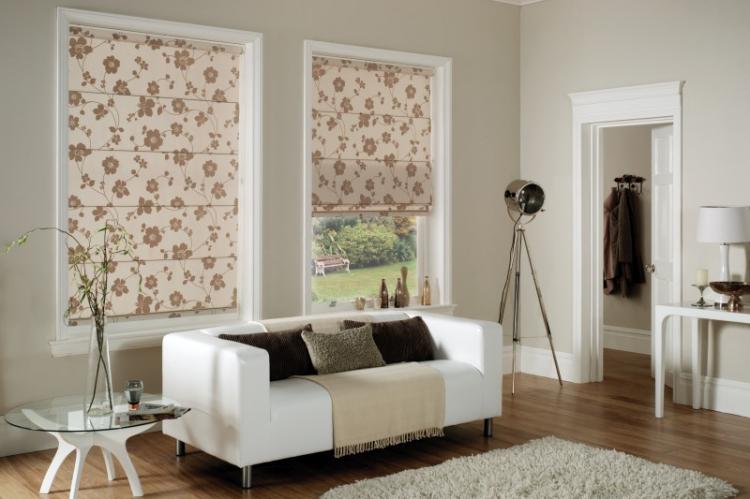
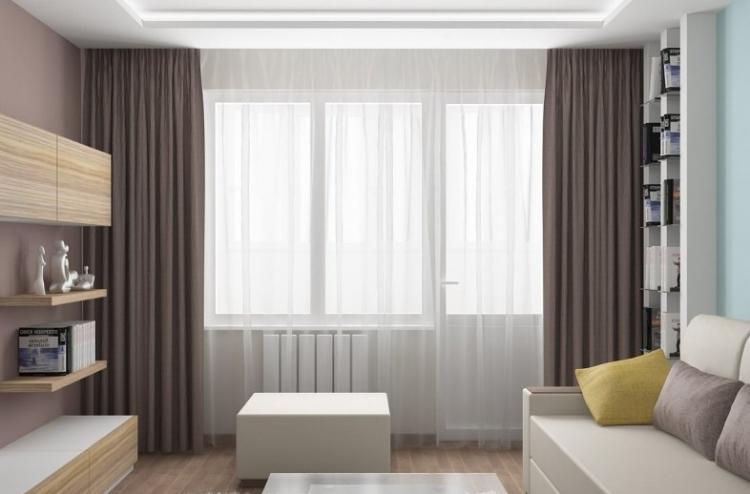
Curtains for the living room - photo
Can't finally decide on the choice of curtains for the living room and hall? Do not rush! We have prepared a large selection of photos for you. Perhaps this is where you will find your ideal option!
